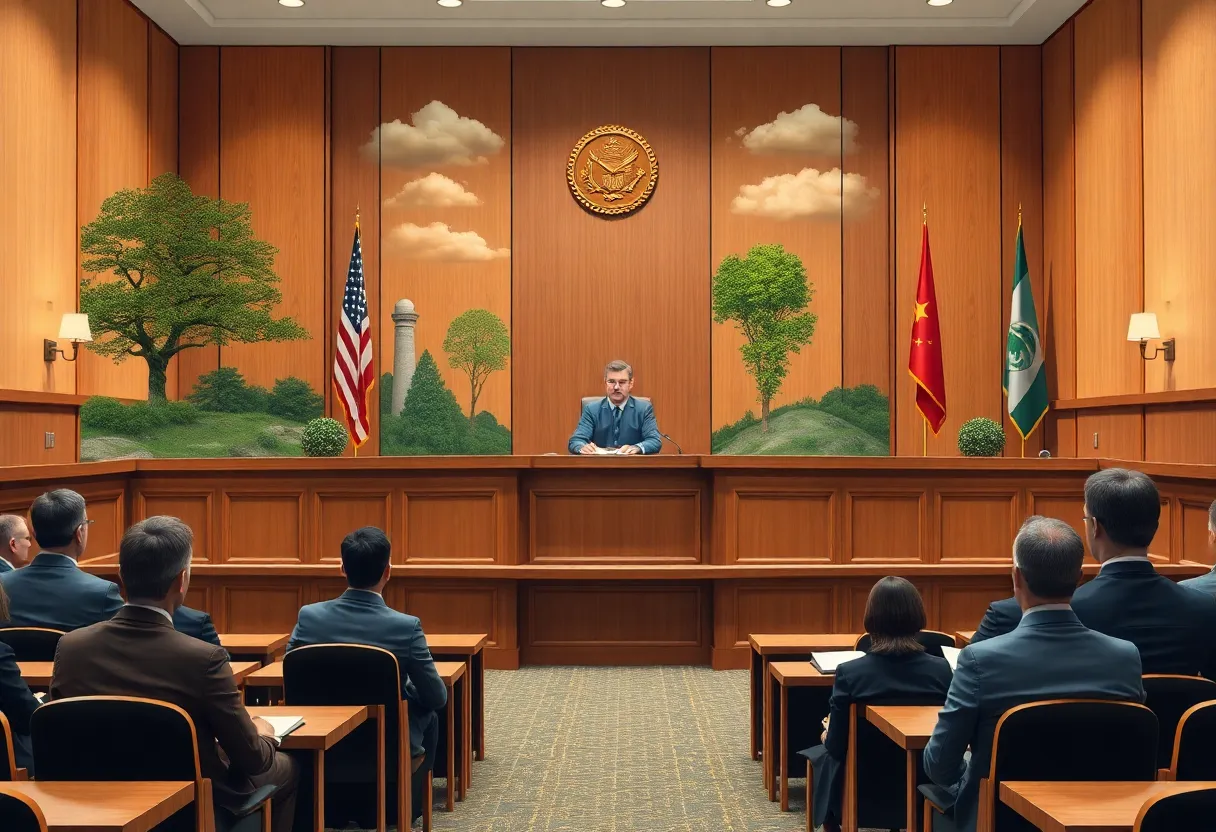News Summary
A recent hearing indicated that New York State may be found in violation of its climate law as Judge Julian Schreibman expressed skepticism towards state arguments. The lawsuit, initiated by climate justice groups, claims that the state has failed to issue necessary regulations under the 2019 Climate Leadership and Community Protection Act (CLCPA). Judge Schreibman highlighted deadlines for emissions regulations and criticized the state’s postponements, raising concerns about future compliance with climate goals.
New York – A recent hearing suggests that New York State may be found in violation of its climate law as Judge Julian Schreibman of the Ulster County Supreme Court indicated he is likely to rule against the state. The lawsuit, initiated by four climate justice groups, alleges that the state has not met its regulatory obligations under the 2019 Climate Leadership and Community Protection Act (CLCPA).
During the session, Judge Schreibman expressed his skepticism regarding the arguments presented by the New York State Department of Environmental Conservation (DEC) attorney, Meredith Lee-Clark. Lee-Clark claimed that the state’s inability to issue necessary regulations to curb greenhouse gas emissions was due to “change and uncertainty.” Schreibman challenged this rationale, stating it was not a valid standard for governance and noted that past legal precedence strongly favored the plaintiffs.
The plaintiffs contend that the state’s failure to implement emissions-cutting regulations violates the mandates set forth in the CLCPA. A major component of the law requires the DEC to have these regulations in place by 2024 to facilitate significant reductions in greenhouse gases. This lawsuit originated after Governor Kathy Hochul paused the cap-and-invest policy aimed at achieving these emissions cuts in March 2025. The Hochul administration justified this decision by citing economic disruptions caused by the pandemic and resistance from government sectors.
While discussing the state’s climate efforts, Lee-Clark emphasized that climate change represents a “generational problem” and highlighted a new $1 billion fund for climate action included in the state’s 2025 budget. However, Schreibman focused on the statutory requirements of the climate law rather than the merits of ongoing efforts, effectively questioning the legitimacy of the DEC’s claim that delays were permissible.
Furthermore, Schreibman pointed out that the New York legislature had multiple opportunities to adjust the deadlines within the CLCPA but chose not to. This lack of revision raises questions regarding the DEC’s rationale for postponing compliance with the law.
The attorney representing the climate advocacy groups, Rachel Spector from Earthjustice, expressed optimism based on the comments made by the judge during the hearing. Despite the potential for delays in the legal process, Schreibman stated it was unlikely he would compel the state to act immediately, especially if the state decided to appeal his ruling to a higher court. Should an appeal occur, it could extend the case’s timeline, potentially affecting Hochul’s chances for re-election and delaying resolutions regarding climate policies until at least 2027.
The Hochul administration has reiterated its dedication to establishing an economy-wide system to reduce emissions. However, specific timelines and details remain uncertain. Schreibman underscored the urgency of compliance with the CLCPA while contrasting the plaintiffs’ timelines against the state’s justifications for postponing action. A draft state energy plan further revealed that New York would likely miss its 2030 emissions reduction targets, pushing the deadline to at least 2036, with shortfalls estimated in the tens of millions of metric tons.
In light of federal policy changes, prior regulations cited by the DEC as evidence of progress were invalidated following the Trump administration’s shift toward anti-climate action policies. The DEC has maintained that it is making strides in developing necessary regulations, even amidst these challenges.
This case is emblematic of not only legal disputes surrounding compliance with climate laws but also the broader tensions that persist at the state level regarding climate initiatives, especially in the face of fluctuating federal policies and ambitions.
Deeper Dive: News & Info About This Topic
- NY Focus: New York Climate Law Lawsuit
- NY Times: Brown University Offshore Wind
- Gothamist: Proposed EPA Policies Threaten NY’s Climate Law
- Sidley: New York Passes Second in the Nation Climate Change Superfund Act
- V&E: New York Passes Climate Superfund Legislation
- Wikipedia: Climate Change in New York (state)
- Encyclopedia Britannica: Climate
- Google Search: New York climate law
- Google Scholar: New York Climate Leadership and Community Protection Act
- Google News: New York Climate Lawsuit

Author: STAFF HERE NEW YORK WRITER
The NEW YORK STAFF WRITER represents the experienced team at HERENewYork.com, your go-to source for actionable local news and information in New York, the five boroughs, and beyond. Specializing in "news you can use," we cover essential topics like product reviews for personal and business needs, local business directories, politics, real estate trends, neighborhood insights, and state news affecting the area—with deep expertise drawn from years of dedicated reporting and strong community input, including local press releases and business updates. We deliver top reporting on high-value events such as New York Fashion Week, Macy's Thanksgiving Day Parade, and Tribeca Film Festival. Our coverage extends to key organizations like the Greater New York Chamber of Commerce and United Way of New York, plus leading businesses in finance and media that power the local economy such as JPMorgan Chase, Goldman Sachs, and Bloomberg. As part of the broader HERE network, including HEREBuffalo.com, we provide comprehensive, credible insights into New York's dynamic landscape.





